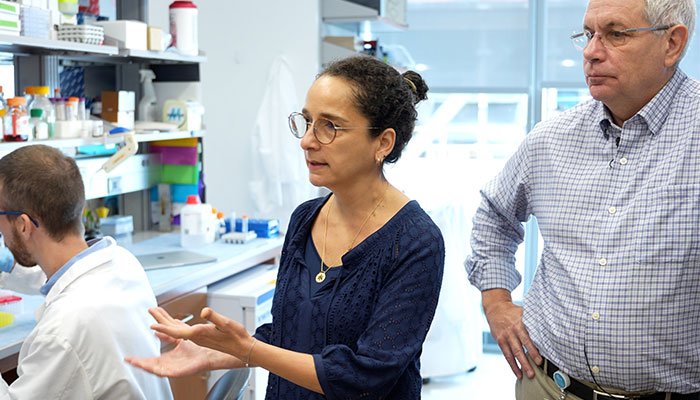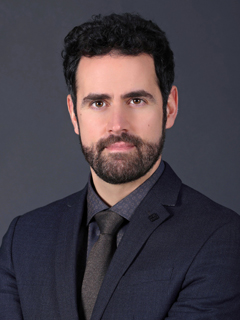HOW CAN WE HELP YOU? Call 1-800-TRY-CHOP
In This Section
CHOP Researchers Awarded Cancer Grand Challenges Funding

Yael Mossé, MD, professor of Pediatrics, is leading Team KOODAC, alongside John Maris, MD, the Giulio D'Angio Chair in Neuroblastoma Research (right).
ingenol [at] chop.edu (By Lauren Ingeno)
Children's Hospital of Philadelphia researchers are part of two global teams awarded Cancer Grand Challenges funding to find treatments for some of the most impenetrable childhood cancers.
Co-founded by the National Cancer Institute (NCI) and Cancer Research UK, the initiative selected five teams — chosen from 176 initial applicants — to receive grants of up to $25 million.
CHOP Professor of Pediatrics Yael Mossé, MD, is leading Team KOODAC to tackle the challenge of solid tumors in children. The team includes researchers at 10 institutions from the United States, Austria, France, Germany, and the United Kingdom, as well as an industry partner, Nurix Therapeutics. CHOP researchers John Maris, MD, the Giulio D'Angio Chair in Neuroblastoma Research, and Adam Wolpaw, MD, PhD, an assistant professor of Pediatrics, are also part of Team KOODAC as co-investigators.
Nikolaos Sgourakis, PhD, an associate professor in CHOP's Center for Computational and Genomic Medicine, is investigating T-cell receptors as part of Team MATCHMAKERS, made up of researchers from Germany, the Netherlands, Norway, the U.K., and the U.S.
Developing Oral Drugs to Attack Solid Tumors
While survival rates for many forms of childhood cancer have improved dramatically over the past three decades, the progress of treatment of children with solid tumors has largely stalled. Solid tumors — which include neuroblastoma, medulloblastoma, Ewing sarcoma, and rhabdomyosarcoma — originate in the peripheral nervous tissues, bones, and muscles.
Cancer is caused by genetic mutations that transform normal genes into oncogenes. However, most therapies empirically target rapidly dividing cells, rather than the proteins encoded by these mutated oncogenes. Differing from adult cancers, oncogenic drivers in children's solid tumors are transcription factors or epigenetic proteins that have historically been considered "undruggable." Moreover, pharmaceutical companies have not prioritized drug development for pediatric solid tumors, due to the small market size.
To address this challenge, Dr. Mossé and Team KOODAC aim to develop targeted protein "degraders" — molecules that remove proteins from cells — that would selectively target oncogenes in the most high-risk, solid-tumor pediatric cancers. They plan to develop targeted protein degraders against five essential oncogenes implicated in the most common, and often-lethal, childhood cancers. These preclinical studies will lead the way for future biomarker-driven clinical trials.
"Degraders can also be made available orally, making it easier to distribute them across the world," said Dr. Mossé, a pediatric oncologist in CHOP's Cancer Center with a special interest in neuroblastoma. "Team KOODAC brings together an interdisciplinary, international team of scientific experts, all sharing the vision of developing safe and effective drugs against previously undruggable childhood cancers."
Team KOODAC is funded by Cancer Research UK, Institut National Du Cancer, and KiKa (Children Cancer Free Foundation) through Cancer Grand Challenges.

Nikolaos Sgourakis
Predicting How T Cells Recognize Tumors
Immunotherapy has revolutionized treatment for some cancers; however, the effects are not universal across cancer types and patient subsets.
This type of therapy works by harnessing a patient's T cells — a type of white blood cell that protects the body against invaders. Each of the millions of T cells in a single patient has a unique T-cell receptor that recognizes different antigens (foreign substances) and marks them for destruction.
This molecular diversity of T-cell receptors (TCRs) has made it challenging to understand which tumor antigens are recognized by T cells, how T cells interact with the antigens presented by protein complexes on cancer cell surfaces, and how these interactions differ in those who respond to treatment versus those who don't.
To answer these questions, CHOP's Dr. Sgourakis and Team MATCHMAKERS will develop novel methods and new algorithms to create large, integrated datasets of TCRs and peptide-MHCs. Their overall goal is to predict which antigens are recognized by T cells using simple laboratory tests and computational prediction, and to develop the tools that can be used to design TCRs for personalized immunotherapies.
An essential component of the MATCHMAKERS Team is the inclusion of 3D structural data on T cell receptor interactions, which will inform the development of computational methods for predicting receptor specificity and help the team to design new receptors that can be used for targeted therapies.
The Sgourakis Lab will contribute their unique expertise in structural biology methods, particularly Nuclear Magnetic Resonance, using systems and tools that they have been developing over the past 10 years. Their efforts will be enhanced by the University of Pennsylvania's new, state-of-the-art spectrometer. This resource, that is available to the CHOP research community, will enable a premier center for translational structural biology at CHOP & Penn.
"Integration of advanced structural biology tools with deep learning techniques has a lot of potential for deciphering the TCR recognition 'code.' Once this is complete, we can develop software that could be used in any lab, anywhere in the world," Dr. Sgourakis said. "This will allow for better matching of patients with safe, less toxic therapies that could lead to immune rejection of tumor cells while preserving the surrounding healthy tissue."
Team MATCHMAKERS is funded by Cancer Research UK, the National Cancer Institute, and The Mark Foundation for Cancer Research through Cancer Grand Challenges.
The National Cancer Institute and Cancer Research UK, the world's leading funders of cancer research, partnered to launch the Cancer Grand Challenges program in 2020. The initiative aims to provide multiple rounds of funding for interdisciplinary research teams from around the world whose novel ideas offer the greatest potential to advance bold cancer research and improve outcomes for people affected by cancer.